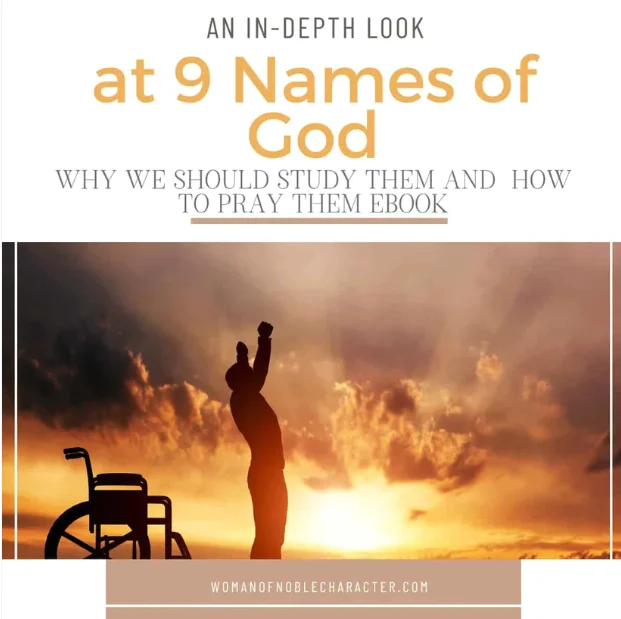This page/post may contain affiliate links. As an Amazon Associate, as well as an affiliate of other programs, this means if you purchase something using these links, I will receive a commission on qualifying purchases at no cost to you! For more detailed information, please visit our Affiliate Disclaimer page
God is often referred to by many different names throughout the Bible, all with significant meaning or highlighting specific attributes of Him.
Throughout history, God has revealed Himself to humanity in many different ways. One way is by revealing His personal name, which He did long before sending his Son on earth.
What is the meaning of Adonai in the Bible? Although Adonai can be translated as “Lord,” it is more appropriately understood when taken within the context of its biblical usage. The name signifies divine sovereignty and authority, often expressed in scripture.
(If you have missed previous posts on the names of God, you can find them here: Jehovah Rapha, Jehovah Nissi, Jehovah Jireh, Yahweh, Jehovah Rohi, and Jehovah Elohim).
אדוני

Though it is usually interpreted as a plural of majesty, Adonai’s syntactic usage can be seen to relate almost exclusively back to God.
While it is true that Adonai frequently appears in the Old Testament, there are many different names for God.
The name Adonai meaning is simply the word for “Lord.”
Merriam-Webster Dictionary defines Lord as “someone or something having power, authority, or influence; a master or ruler.”
In 1 Samuel 24:8, 26:17, and 29:8, David refers to Saul as “my lord the king” and uses the term Adonai.
Afterward David also arose and went out of the cave, and called after Saul, “My lord the king!” And when Saul looked behind him, David bowed with his face to the earth and paid homage.
1 Samuel 24:8 (ESV)
Saul recognized David’s voice and said, “Is this your voice, my son David?” And David said, “It is my voice, my lord, O king.”
1 Samuel 26:17 (ESV)
And David said to Achish, “But what have I done? What have you found in your servant from the day I entered your service until now, that I may not go and fight against the enemies of my lord the king?”
1 Samuel 29:8 (ESV)
Likewise, Abner refers to David in the same way in 2 Samuel 3:21. We find this term of reverence throughout the book of 2 Samuel also referring to David.
And Abner said to David, “I will arise and go and will gather all Israel to my lord the king, that they may make a covenant with you, and that you may reign over all that your heart desires.” So David sent Abner away, and he went in peace.
2 Samuel 3:21 (ESV)
The word “Adonai” refers to both Lord and God. Some followers of Elisha called him Adonai, as we see in 2 Kings 2:19.
Now the men of the city said to Elisha, “Behold, the situation of this city is pleasant, as my lord sees, but the water is bad, and the land is unfruitful.”
2 Kings 2:19 (ESV)
The word “Adonai” is a term of respect used throughout the Old Testament. It means Lord or Master, and in keeping with its usage, this phrase also means Lord, our heavenly father.
It would be more accurate to say that Adonai is used as a description of God or as a title of respect rather than a proper name of God.
Even though David would have had no problem addressing God as “Adonai” and then addressing Saul with this respectful title, it was a verbal norm during biblical times.
The word Lord is used throughout the English Old Testament, but it’s only sometimes a translation for Adonai.
The ancient Jews believed that the covenant name of God, “Yahweh,” was so holy and powerful many Jews feared even to say it.
Even today, when Jews read the Hebrew text (which initially had only consonants), they pronounce YHWH as “Adonai.” In keeping with this tradition, most English versions translate YHWH as “LORD” (in all caps).
God is the Lord of all things, making Him aptly titled “Adonai.”
Behold, the ark of the covenant of the Lord of all the earth is passing over before you into the Jordan.
Joshua 3:11 (ESV)
You can find everything that you are looking for about The Names of God and Why We Should Study and Pray Them, as well as in-depth studies on each of the 9 names of God we cover (Adonai, Abba, Jehovah Jireh, and many more) It includes a video and additional downloads. * 73 pages
Where Is This Hebrew Name for God Mentioned in the Bible?
God’s name and variations of Adonai in the Bible are found in more than 400 verses throughout scripture.
In the Old Testament, Adonai occurs 434 times. There are heavy uses of Adonai in Isaiah (e.g., Adonai Jehovah). It occurs 200 times in Ezekiel alone and appears 11 times in Daniel Chapter 9. Adonai is first used in Gen 15:2.
As the definition states, the use of the name “Lord” can have a possessive quality. Therefore, God called upon Moses to announce His name in front of Pharoah, and in so doing, He revealed the Hebrews as His people.
God also said to Moses, “Say this to the people of Israel: ‘The Lord, the God of your fathers, the God of Abraham, the God of Isaac, and the God of Jacob, has sent me to you.’ This is my name forever, and thus I am to be remembered throughout all generations.
Exodus 3:15 (ESV)
God speaks to the prophet Isaiah about the upcoming punishment for the King of Assyria.
The Lord described as “the One who demands justice,” will mete severe judgment on him because he committed terrible acts against Israel.
Therefore the Lord God of hosts
Isaiah 10:16 (ESV)
will send wasting sickness among his stout warriors,
and under his glory a burning will be kindled,
like the burning of fire.
Other times the name of God Adonai in the Bible carries the meaning and respect of praise. King David, and other Psalmists, rejoiced in acknowledging God’s authority and proudly declared it.
O Lord, our Lord,
Psalm 8:1 (ESV)
how majestic is your name in all the earth!
You have set your glory above the heavens.
The Lord has established his throne in the heavens,
Psalm 103:19 (ESV)
and his kingdom rules over all.
Several additional variations on the name Adonai in the Bible appear in Scripture:
Adon (Lord) was the Hebrew root word. It was used for humans and angels, as well as God.
So Sarah laughed to herself, saying, “After I am worn out, and my lord is old, shall I have pleasure?”
Genesis 8:12 (ESV)
Adonai ha’adonim (the Lord of lords) is a forceful statement of God’s eternal nature as ruler.
Give thanks to the Lord of lords,
Psalm 136:3 (ESV)
for his steadfast love endures forever;
Adonai Adonai (the Lord YHWH or the Lord God) also doubly affirms God’s sovereignty.
For you separated them from among all the peoples of the earth to be your heritage, as you declared through Moses your servant, when you brought our fathers out of Egypt, O Lord God.”
1 Kings 8:53 (ESV)

Why Adonai Is a Significant Name for God
God’s name is a central part of who He is. It reminds us that we can never fully understand the complexities and wonders in this world, but by studying some aspects of His character through scripture, you will come to know Him better. Our relationship with our Heavenly Father can become even closer as we see, study, and embrace His many names, including Adonai in the Bible.
The name of God, Adonai, in the Bible, adds another layer to God’s characteristics. The fact that He is Master over everything and will work all things out for good.
Adonai in the Bible: 3 Reasons Why God is Still Adonai
The idea of having a master can conjure up pictures of one person possessing another, and that kind of slavery has no place in today’s world. We need to remember that the concept of Adonai has nothing at all to do with slavery. This term means God is our leader, and he guides us through life’s journey with the Holy Spirit.
The Bible clearly states that God always remains present, and He rightfully rules over all. Therefore, we are to submit ourselves, our whole body and soul, to the good Father. We cannot give Him less than all we have or can be; He deserves all of us. We are not to submit to or worship any other human or idol. His Word also teaches us why this is part of God’s best plan for us.
1. We were created to need God as our master.
We all feel the calling of a God-sized hole in our lives. It isn’t there to make you question your worth or capabilities but rather to guide yourself back toward Him, Who can fill that need through His grace alone. Unfortunately, we are all too often guilty of trying to fill the emptiness in our lives with anything that will do, whether it be unhealthy relationships or destructive habits. This is a dangerous game and can lead us down dark paths where we make bad decisions and end up in a spiral of sin.
2. God is the best Master.
One truth about life is that everybody serves someone, and we have a choice about who we will serve. Imagine serving a master who returns your loyalty with unconditional love, comfort, and abundant provision. That is the loving Lordship that God offers, and we don’t want to miss out on it.
3. Jesus taught that God was His Master and ours.
Jesus always knew who was in charge. He came to Earth as an obedient son, fulfilling God’s plan for humanity by being born of a mortal woman and dying on the cross centuries ago. He acknowledged Adonai and the true meaning of the name.
Do you not believe that I am in the Father and the Father is in me? The words that I say to you I do not speak on my own authority, but the Father who dwells in me does his works.
John 14:10 (ESV)
Jesus taught His disciples what it means to be fully submitted and surrender themselves to God’s will. By following Him, we can receive great rewards in this life and eternal ones in heaven.
These things I have spoken to you, that my joy may be in you, and that your joy may be full.
John 15:11 (ESV)
In the Old Testament alone, Adonai occurs 434 times. There are heavy uses of Adonai in Isaiah (e.g., Adonai Jehovah). It occurs 200 times in Ezekiel independently and appears 11 times in Daniel Chapter 9. Adonai is first used in Genesis 15:2.

Here are some beautiful verses using Adonai in the original text:
Let them praise the name of the Lord, for his name alone is exalted; his majesty is above earth and heaven.
Psalm 148:13 ESV
A Psalm of David. The Lord is my shepherd; I shall not want.
Psalm 23:1 ESV
I appeared to Abraham, to Isaac, and to Jacob, as God Almighty, but by my name the Lord I did not make myself known to them.
Exodus 6:3 ESV
God said to Moses, “I am who I am.” And he said, “Say this to the people of Israel, ‘I am has sent me to you.’”
Exodus 3:14 ESV
That they may know that you alone, whose name is the Lord, are the Most High over all the earth.
Psalm 83:18 ESV
In the beginning, God created the heavens and the earth.
Genesis 1:1 ESV
To the choirmaster: according to The Gittith. A Psalm of David. O Lord, our Lord, how majestic is your name in all the earth! You have set your glory above the heavens.
Psalm 8:1 ESV
“You shall not take the name of the Lord your God in vain, for the Lord will not hold him guiltless who takes his name in vain.
Exodus 20:7 ESV
When my boys were small, I recall a quarrel between them. My older son was telling my younger one what to do. My younger one said, “You are not my boss.” Fast forward over ten years later, I still hear this interchange between them.
At work, I have a boss that dictates my work.
In addition, I am married. My husband is the head of the home, and I, his helpmeet.
In nearly every area of our lives, we have a boss or someone we need to answer to, but what about our life in general?
Who is your master? If you believe in Christ, your master should be our God.
Why Does the Name Adonai in the Bible Matter?
Why does it matter that we should know names for God, such as Yahweh, Jehovah Rohi, El Roi, and Adonai in the Bible, etc.?
We must know the names of God because each of His names has essential meanings in the Bible. They reveal to us different layers of God’s character. Whenever God names or renames a person in the Bible, He proclaims something important about who they are or his plan for their life.
He brought him to Jesus. Jesus looked at him and said, “You are Simon the son of John. You shall be called Cephas” (which means Peter).
John 1:42 (ESV)
In the example of Peter, Peter’s name becomes his purpose. He becomes the rock of the church (Acts 2:14-41).
When we know the names of God, then his attributes come to light. He becomes more than just a creator; he is an intimate part of our lives with whom there can be no separating. As a result, we can get to know Him better.
The name of God, Adonai in the Bible, is mighty. It can remind you that no matter what happens in life, it’s always been part of something bigger and better planned by The One who knows every move before they happen – your ultimate guardian Adonai.
Praying His sacred title will help put everything into perspective when times get challenging or difficult choices need to be made because as long as we remember our dependence on Him through His grace, we can better follow His will and plan for our life.
Who shall separate us from the love of Christ? Shall tribulation, or distress, or persecution, or famine, or nakedness, or danger, or sword? As it is written,
Romans 8:35-39 (ESV)
“For your sake we are being killed all the day long;
we are regarded as sheep to be slaughtered.” No, in all these things we are more than conquerors through him who loved us. For I am sure that neither death nor life, nor angels nor rulers, nor things present nor things to come, nor powers, nor height nor depth, nor anything else in all creation, will be able to separate us from the love of God in Christ Jesus our Lord.
A Prayer to Adonai
I praise You, Lord. Every day with You is better than a thousand years in the palaces of kings! My heart belongs only to Yours, and I call on your name, Adonai, that brings forth joy overflowing from deep within my soul. There is no greater joy than serving You; I am blessed because you have made me your own. I am thankful for Your Word that gives life to those who believe in You!
Do you submit every area of your life to Him? Or, are there areas that you, out of habit or addiction or fear or something else, haven’t given to Him, Adonai, yet?
If you allow Him to be your Adonai, He is the one you will submit to in all things. You will bow down before Him (literally and figuratively). He is the ultimate boss or authority figure in your life.
The first time we find this name for God used in the Bible is in Genesis 15: 1-2 when God is speaking with Abram:
“After this, the word of the LORD came to Abram in a vision: “Do not be afraid, Abram. I am your shield, your very great reward.” But Abram said, “O Sovereign Lord, what can you give me, since I remain childless and the one who will inherit my estate is Eliezer of Damascus?”
Genesis 15: 1-2
When you read about Abraham in the Bible, you see many instances of how he allowed God to be Adonai to him.
He followed God out of his homeland of Ur.
He relied on God to provide for his family.
Later, he trusted God when he was willing to sacrifice his son as an offering.
In the passage above, however, Abraham seems to question God’s authority regarding his wife’s barrenness. Was that a momentary lapse on Abraham’s part? Or perhaps, was Abraham influenced by his wife’s despair?
As Christians, we need to be sure that the words from our mouths match our behaviors. For example, do we praise God with our lips yet act in ways that do not honor Him? Are we honoring Adonai in all we do?
There are many ways that this can happen. We think that by volunteering to help in the church, we are honoring God, but if you allow it to take over your life, you are not placing God as your master.
Many things can take over as bosses in our lives: money, things, work, food, friends, and even our children or spouse. When we put those things in higher priority than God, we are allowing them to be our “boss.”
Spend some time in prayer today, asking God to shine a light on any area of your life that you are putting before Him. Ask Him to be the Lord of your life and your heart.
Did you learn something new about Adonai in the Bible? Which is your favorite of the names of God?
For more studies on the names of God, see this section of my website.
For more study on the names of God, including Jehovah Shalom, consider these recommended resources:
The Names of God: 52 Bible Studies for Individuals and Groups by Ann Spangler
Praying the Names of God by Ann Spangler
Because of Him,
Sue
ESV – “Scripture quotations are from The ESV® Bible (The Holy Bible, English Standard Version®), copyright © 2001 by Crossway, a publishing ministry of Good News Publishers. Used by permission. All rights reserved.”


